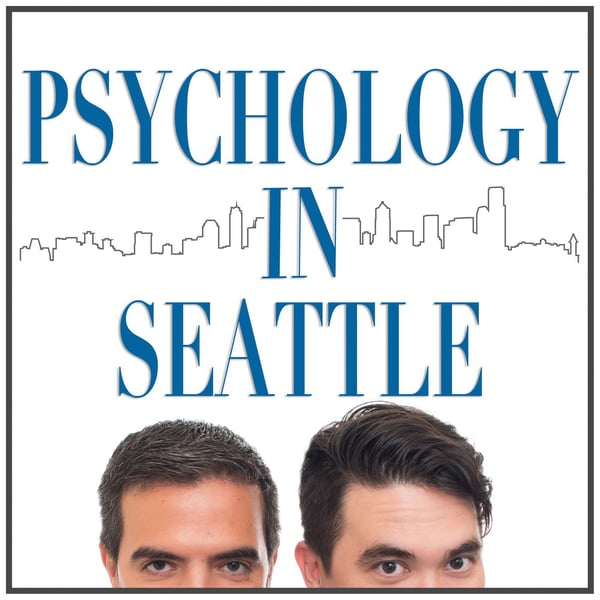BPD, Schemas, Class Consent, Aspiring Therapists, and Lateness
Psychology In Seattle Podcast
Kirk Honda
4.6 • 1.2K Ratings
🗓️ 10 March 2021
⏱️ 68 minutes
🧾️ Download transcript
Summary
Become a patron: https://www.patreon.com/PsychologyInSeattle
Email: https://www.psychologyinseattle.com/contact
Get merch: https://teespring.com/stores/psychology-in-seattle
Instagram: https://www.instagram.com/psychologyinseattle/
Discord: https://discord.gg/6QR4sE8x9K
Reddit: https://www.reddit.com/r/PsychologyInSeattle/
Twitter: https://twitter.com/PsychInSeattle
Facebook Official Page: https://www.facebook.com/PsychologyInSeattle/
Facebook Fan Page (run by fans): https://www.facebook.com/groups/112633189213033
The Psychology In Seattle Podcast ®
Disclaimer: The content provided is for educational, informational, and entertainment purposes only. Nothing here constitutes personal or professional consultation, therapy, diagnosis, or creates a counselor-client relationship. Topics discussed may generate differing points of view. If you participate (by being a guest, submitting a question, or commenting) you must do so with the knowledge that we cannot control reactions or responses from others, which may not agree with you or feel unfair. Your participation on this site is at your own risk, accepting full responsibility for any liability or harm that may result. Anything you write here may be used for discussion or endorsement of the podcast. Opinions and views expressed by the host and guest hosts are personal views. Although, we take precautions and fact check, they should not be considered facts and the opinions may change. Opinions posted by participants (such as comments) are not those of the hosts. Readers should not rely on any information found here and should perform due diligence before taking any action. For a more extensive description of factors for you to consider, please see www.psychologyinseattle.com
This show is part of the Spreaker Prime Network, if you are interested in advertising on this podcast, contact us at https://www.spreaker.com/show/3269717/advertisement
Transcript
Click on a timestamp to play from that location
| 0:00.0 | So Bob, as usual, we have a lot of really great questions from the patrons for us to answer. |
| 0:05.4 | What do you say, Bob? Let's answer these questions. This is the Psychology and Seattle podcast. |
| 0:10.5 | I'm your host, Dr. Kirk Honda. I'm a therapist, a professor, and a question answerer. Who are you, Bob? |
| 0:17.8 | You're every now and every fortnight question answer, a therapist in practice here in Seattle |
| 0:23.2 | and your old friend from grad school. Upper tier patron Joyce from Los Angeles says, |
| 0:28.9 | Dear Kirk and Bob, last year I was diagnosed with borderline personality disorder. |
| 0:34.0 | Therapy has been a sobering and humbling experience. As I researched the traits of borderline |
| 0:39.6 | in relationships romantic and orthotonic, articles online seem to lend themselves more towards |
| 0:45.2 | people affected by a borderline parent friend or partner. The conversations between you two |
| 0:50.8 | offer a nuanced and compassionate understanding of the diagnosis from multiple perspectives. |
| 0:55.9 | I cannot express how invaluable your conversations have been. The podcast has become a safe |
| 1:00.4 | emotional presence in my life that allows me to continue the work to look inward and do right by |
| 1:05.3 | those I love. Changing the subject, all mental health professionals I've seen have been white |
| 1:12.3 | and I find it to be a challenge when speaking of intergenerational trauma in immigrant families |
| 1:19.3 | or anything related to racism. I appreciate your perspective as an Asian American and really wish |
| 1:24.7 | that the mental health profession were more diverse. Why do you think this happens? What more |
| 1:29.6 | can be done? Bob, what do you think as a white person? The question is, why is it mostly white people |
| 1:37.0 | that are that do this kind of work? Yeah. I don't know. Maybe it's, well, okay, psychotherapy has its |
| 1:47.7 | roots in the medical community in Europe. So that's white people, white men. It comes into the US |
| 1:58.7 | in the 10s, 20s, 30s, white guys, doctors, I think mostly. I don't know when we started having |
| 2:07.2 | psychology degrees. In the 40s and 50s CBT comes online. That's medical doctors trying to help |
| 2:17.0 | soldiers with what has become known as PTSD. So a lot of the earlier writers are medical doctors. |
... |
Please login to see the full transcript.
Disclaimer: The podcast and artwork embedded on this page are from Kirk Honda, and are the property of its owner and not affiliated with or endorsed by Tapesearch.
Generated transcripts are the property of Kirk Honda and are distributed freely under the Fair Use doctrine. Transcripts generated by Tapesearch are not guaranteed to be accurate.
Copyright © Tapesearch 2025.

